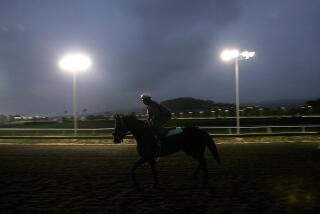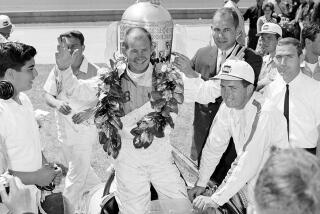These vintage cars were made to race
Blasting toward the notorious Corkscrew at the Laguna Seca raceway in his Shelby Cobra, Lynn Park took a stab at the brakes -- and came up short.
The front-brake failure left him hurtling through one of the nation’s most daunting stretches of asphalt -- a one-two punch of tight turns, compounded by a steep drop-off -- with little to slow the 400-horsepower two-seat convertible. Park yanked the wheel. Momentum took over.
“And there I was, going backwards down the Corkscrew,” Park recalled.
Most car collectors treat their museum-caliber antiques with a bit more care. Park’s was not just any Cobra, but the first of just five ever built for racing in Europe, a 1964 model worth about $2 million. But what’s the point of owning a Shelby Cobra, Park figures, if it’s never put to its intended use?
Park, 70, a retired elevator company owner from La Canada Flintridge, next weekend will be among about 540 collectors racing their classic sports cars in one of the most exclusive hobbyist racing events on Earth, the Rolex Monterey Motorsports Reunion. Held annually since 1974, the three-day event in Monterey County, Calif., includes street and racing cars from past decades.
The event is part of Monterey Classic Car Week, which runs Aug. 12-18 and culminates with the Pebble Beach Concours d’Elegance, the world’s premier collector car show. Other highlights of the week -- a bucket-list item for any car enthusiast -- include high-dollar car auctions by companies including Gooding & Co. and RM Auctions; the Quail Motorsports gathering of late-model exotics like Bugatti and McLaren; and Concorso Italiano, a meeting of mostly Italian cars and motorcycles.
The vintage cars race in classes similar to the professional competitions of their eras. They are grouped based on marque, engine size and vintage. Old-school Ferraris run against the Aston Martins and Jaguars that gave them trouble decades ago. Muscle car fans can watch original Mustang Boss 302s battle with Chevy Camaro Z/28s, just as they did in the late 1960s and early 1970s. An entire class will pit early Porsche 911s against one another, in celebration of the model’s 50th anniversary.
For Park, who competes in other vintage races and classic car rallies, the Motorsports Reunion is the highlight of his year. “You can’t have any more fun than playing with old cars,” he said.
The event has become something of a family affair for Park, whose two sons have raced alongside him in his Cobras for years. Park has a garage full of them, a stunning storehouse of priceless sheet metal.
The Shelby Cobra has long been revered by collectors. The cars trace their roots back to 1962, when Carroll Shelby crammed a Ford V-8 engine into a small, lightweight roadster built by the British company AC.
Almost immediately the cars started challenging Ferraris and Chevrolet Corvettes in competition. The original Cobras weren’t cheap, however, costing more than a similar Corvette of the era.
Known in classic car circles as Mr. Cobra, Park has been collecting the marque since he bought his first after getting out of the Army in 1969. The first purchase got him hooked.
“If one’s good, two’s got to be better,” Park said, chuckling.
He still owns that second Cobra today. It’s only the 10th model the late Carroll Shelby ever made, and the one Park’s oldest son races at the Motorsports Reunion.
Over 45 years, Park bought about 50 Cobras, he estimates. Currently his collection holds about a dozen, housed in a nondescript garage. Its walls are crowded with countless photos of Park and Shelby, whom Park considered a close friend before Shelby died last year.
Winning the vintage races comes with a particular thrill. But that’s not what will stick in the minds of the spectators later.
“After the race, or a week later, nobody remembers who won -- but they all remember who crashed,” Park said.
Last year, Rob Walton, son of Wal-Mart founder Sam Walton, ran his Shelby Daytona Cobra Coupe off the track and wrecked it.
“Walton’s a very good driver; he just lost his brakes and off he went,” Park recalled. “There’s very little margin for error.”
Walton’s Daytona Coupe is one of only five ever made, easily worth $15 million.
Insurance for the cars while they’re being raced on the track is very rare, Park said, although a few companies are trying to make it work. However, many racers feel that such a comprehensive backup plan might encourage drivers to take more risks than necessary.
Still, there’s a limit to how hard most drivers are willing to push themselves and their cars at the Rolex races. Those driving too aggressively, or found to be at fault in a crash, risk being kicked out of the rest of the events that year and the next.
“People who go there just to race aren’t going to stick with it for very long,” Park said. “You start because of the cars and the racing, but before too long it’s the social side of it that takes over.”
Within the close-knit community of vintage racers, such a penalty is rarely needed. Although drivers are certainly mindful of the value of their own cars, they’re often even more careful to avoid damaging the car racing alongside.
“I’m more aware that the car next to me is worth $2 million, not mine,” Park said.
Other classic car owners take a slightly different approach at the Rolex Reunion. They’ll hire a professional driver, like a jockey in a horse race.
McKeel Hagerty, founder and chief executive of Hagerty Insurance, which insures classic cars, recalled sitting in the stands at last year’s races and watching the man next to him tap his wife on the leg at the end of the race. “Well, we won another one, dear,” the man said.
This differs from the mentality of vintage racing overseas. At races such as the Goodwood Festival of Speed and the Silverstone Classic -- both held in Britain -- drivers focus more on winning and take more risks.
“These guys are just flinging multimillion-dollar cars right at the edge around the track,” Hagerty said.
At Laguna, drivers tend to keep the cars within their limits. That suits Park just fine. The end of the race brings a different kind of satisfaction.
“There’s something to be said for putting your car on the trailer at the end of the day in one piece,” Park said. “And everybody having a beer.”
--







